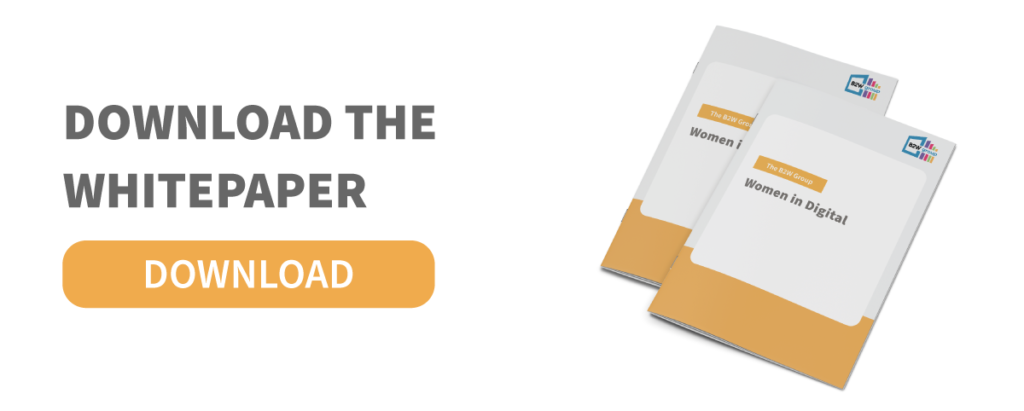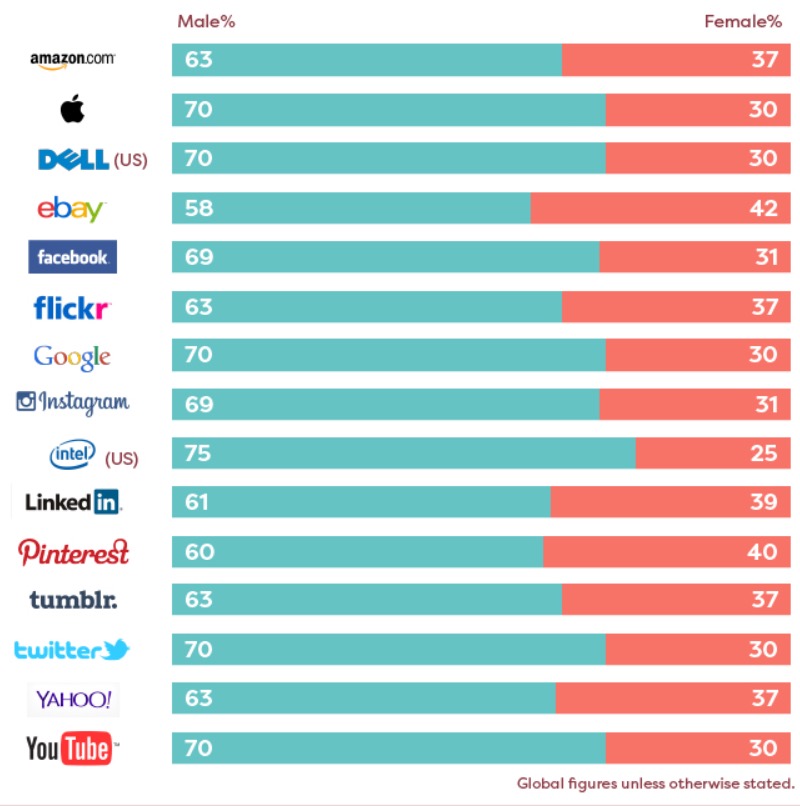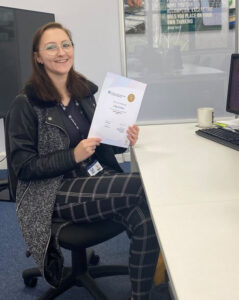
Women in Digital
Now more than ever, the demand for digital skills in the workplace is high. Those employees who are able to demonstrate a high level of digital literacy are more likely to excel in the remote style of working we see in 2021 and beyond.
Digital is no longer a niche line of work kept to its own world within tech companies; whatever industry a business is in, digital plays a key role. From marketing, IT support, logistics, organisation, HR, payroll, operations – all of these functions are digital in one way or another. Therefore, without a strong digital presence within a business (either in-house or outsourced to a digital agency), businesses will suffer due to inefficient processes or the need for time-consuming manual work.
How Many Women Are There in Digital?

A study launched by the European Commission found that although there is a growing demand for ICT specialists and digital profiles, the percentage of people with a digital-related education is decreasing.
Part of the Commission’s findings showed that there remains a gender gap when it comes to women wanting to take up digital careers. The study found that there are fewer women than men taking up ICT related jobs and education. Just as significant is the statistic that women make up just 17% of IT specialists in the UK.
Additionally, the report found that there are four times more men than women with ICT-related studies and the share of men working in the digital sector is 3.1 times greater than the share of women.
In the UK, more than 2 million people are employed in the digital sector and the industry is worth an annual £137 billion. However, just 26% of those working in the digital sector are female.
The battle for talent never stops as projections suggest that 1.2m people will be needed to fill jobs in the digital sector by 2022. 40% of employers have reported that having such high volumes of vacancies aren’t just causing them to have increased workloads but they’re also losing business due to not being able to fill job roles.
Across the “Big Tech” industry, the number of male employees also outweighs the number of women.
Why Does This Matter?

If we ignore the reasons for this trend for a moment the fact remains that a lack of women in digital decreases the talent pool for employers. And the larger the skilled talent pool, the better a company will perform – why limit your options to a narrow sector of a population?
Knowing how to attract women in digital senior positions is something that all businesses need to strive for, as it doesn’t just improve diversity dynamics of teams, but also ensures the sustainability of the growing industry.
83% of female millennials in the UK say they seek out employers with a strong record on diversity, equality and inclusion.
Potential employees are now conscious of diversity within businesses and it’s something a lot of people like to be a part of. Therefore, the more diverse a company, the more it is able to demonstrate a forward-thinking growth attitude, and this in turn makes it more appealing to a wide range, talented workforce.
Is There a Gender Pay Gap?
There are numerous potential reasons for a lack of women in digital.
Some sources of the gender gap cite a sexist culture within the digital industry. Conscious or not, the claim is that due to digital being a predominantly male industry, a “bro culture” develops which alienates women and encourages progression for men. If this is the case, then companies certainly need to ensure their HR policies address equality, diversity and equal opportunities within their companies.
Studies show that (as a rule) men prefer working with things and women prefer working with people. Directing women to pursue a career in digital (a career of things), could be forcing them into a career that they may not enjoy or wish to maintain long-term. The same logic could be applied to men in healthcare (working with people), where women make up three quarters of all personnel.
It’s vital not to over-simplify the problem and to read into issues that may not exist. Looking purely at the equality of outcome can result in pressuring peoples of both genders into industries that may not appeal to them. Instead, equality of opportunity should be pushed to the forefront by increasing awareness of opportunities within digital careers, and a better awareness of women in tech and their impact.
Other gender pay gap sources cite the decline of girls taking up STEM (science, technology, engineering, maths) subjects in Further Education, weakening the available pipeline. For example, in 2018, only 9% of female graduates studied a core STEM subject.
This bottom-up issue is combined with a top-down problem in a lack of key role models within digital. According to research, when asked to name a famous man working in tech, 66% of respondents were able to, while only 22% could name a famous female.
Think about some of the big names in tech and digital (past and present). How many can you name? Alan Turing, Bill Gates, Elon Musk, Mark Zuckerberg, Richard Branson, Steve Jobs – there are plenty to choose from, and these men have undoubtedly earned their position as influential tech trail-blazers. But the reality is that, while there are fewer women in digital in general, there are a wealth of influential women in the industry – Google’s Ruth Porat, Facebook’s Sheryl Sandberg, Reddit’s CEO Ellen Pao. They’re out there, they just don’t receive the same attention or recognition as their male counterparts.
2019’s Women in Apprenticeships Conference was chaired by OneFile’s co-founder and CEO Susanna Lawson. The conference strives to celebrate the role of women in education, and features speakers from a wealth of industries, including digital technology.
Lawson commented: “Dr Julie Hardman for MMU, who is head of the department responsible for their degree-level apprenticeships in digital and technology solutions, spoke about a subject I am passionate about – diversity in tech. Only 17% of the tech workforce and 10% of leadership positions are held by women. There has been research that demonstrates there is unconscious bias existing in tech. Github allows developers to review and accept each other’s code. A recent research study of 1 million Github users showed that when gender was revealed, women’s code acceptance dropped by 12% compared to if their gender was not declared.”
Lawson wrapped up the conference with these inspirational observations from the speakers (both male and female) at the event:
- Seize every opportunity that is presented to you
- Everyone has a different journey and each one is valid
- Be authentic – be you. Anything else is exhausting!
- Be confident
- Have a role model and be a role model
- Pay it forward – people have supported us on our journeys, it is up to us to support others
OneFile is a portfolio-based digital platform which we use within The B2W Group. It’s the perfect tool for allowing our Digital Marketing Apprentices to manage their time and workload and create their portfolio of work.
Supporting Women in Digital at The B2W Group
At The B2W Group, we deliver a variety of educational courses, including those with a focus on digital skills.
Throughout the 2020/2021 academic year, the digital courses within our Pre-Employment division saw more than 200 women progress through our Digital Skills and IT Fundamentals courses. The courses are designed to provide valuable digital skills to unemployed people so that they can earn a full-time role in their chosen field.
Emily Thomson of Peterborough commented on her experience of the Digital Skills teaching: “I enjoyed everything about the course. I would [recommend the course] because it’s an amazing opportunity to improve skills and an additional qualification looks good on your CV.”
Meanwhile, 117 women successfully completed one of our digital, IT and social media focused Distance Learning courses.
We spoke to Victoria Bond, a recent graduate of our Level 2 Digital Promotion for Business course. Victoria is the Founder of software-as-a-service (SaaS) company and earned the qualification to learn the digital skills needed to market her business to the right audience.
“The learning was practical and helped move me forward,” Victoria commented. “As I have my own business, it’s helped me to establish a well-thought-out digital marketing plan. I will be able to use this going forward. I think for business owners like myself, or those that are maybe early career / stand alone in a marketing role – the course is great learning. It’s especially valuable to have a tutor when you need it. They give you feedback on your work, which you wouldn’t get from just doing a standard online course.”
Our Apprenticeship provision is designed to create the next generation of digital marketers. Throughout the academic year, 24 women earned their Level 3 Digital Marketer Apprenticeship. The precursor to the apprenticeship – our shorter Diploma in Introduction to Digital Technologies – saw 112 female learners through to completion.
Introduction to Digital Technologies graduate Christine Wallis said: “Before starting this course I had very little knowledge of digital marketing and IT. I gained really useful knowledge that I will be able to build on in the future. Particularly, I enjoyed learning about cyber security and search engine optimisation (SEO). I would definitely recommend this course to others. An excellent course that provides the groundwork for a career in digital marketing or IT.”
Emily Graham’s Experience

We caught up with Marketing Assistant Emily Graham, who recently completed our Pre-Apprenticeship Introduction to Digital Technologies course and then progressed onto the Level 3 Digital Marketer Apprenticeship.
What is your role as a Marketing Assistant?
As the Marketing Assistant my main responsibilities revolve around helping to create content for different marketing campaigns within the business. Getting involved in the development of social media, email, and website content to raise brand awareness and drive user engagement is at the core of my job.
Along with this, creating content such as graphic design, website articles, and company videos to be released on different platforms make up a large amount of my day-to-day work.
Before your apprenticeship, you completed the Pre-Apprenticeship Training course. What made you want to sign up?
After completing university with a degree in creative writing, I was left unsure on where to go next to start my career. I knew I wanted to work in some form of marketing but didn’t know where to start. It was only when a friend said they signed up to a digital marketing introduction course at The B2W Group that I found the opportunity to learn about the job without committing to a role yet.
Once I completed those 3 weeks, I found marketing was the perfect mix of creative and logical thinking which I had been craving.
During the course, what key skills and knowledge did you learn?
I learnt a huge amount over the course of those weeks. Discovering the different elements which make up a successful marketer and the skills needed to be an effective apprentice were very valuable.
I discovered a vast amount about the more technical parts of marketing such as data protection laws and copyright which I didn’t know before. I’m glad I did learn about them, as I never considered this part of marketing before when I was fresh out of uni.
I learnt a lot of employability skills I never thought about acquiring before the course. The ability to put together a basic marketing campaign and even create image assets using Canva were all elements I included in my application to my current role. Along with this, I learnt some of the basics of marketing, which gave me good fundamental knowledge I knew I could expand upon once I landed my role.
What key things did you learn during the apprenticeship?
During my apprenticeship placement, I was able to put into practice the skills and knowledge I had learnt during the training. Putting the training into the context of an actual workplace was a little difficult to begin with, but once I learnt about the values of the business, I became comfortable creating content and helping to complete different marketing campaigns.
As time went on, I had the ability to develop technical skills in areas such as email marketing within Mailchimp, and B2B marketing in a niche industry sector. As part of marketing, I had to develop a wide range of content using a wide range of platforms. This meant I quickly learnt how to use different elements of the Adobe creative suite such as Photoshop and Premiere Pro. Having the ability to learn these while on the job made with a hands-on approach allowed me to learn them quicker, and more effectively, than I ever had before.
In the 18 months I have been working at my current business, I’ve been given the opportunity to create and promote eBook, webinar, service brochure, and much more. I’m excited for the years to come to get involved in more interesting projects.
Since completing your apprenticeship, have you taken on any further responsibilities?
Since completing my apprenticeship in April I’ve taken it upon myself to continue my learning. Signing up to an online course on graphic design and speaking to my manager about my future training are my main focuses for the next year to ensure I am constantly improving and developing as a digital marketer.
In the future, I’m mainly looking forward to taking on more responsibility at my business, handling more independent projects and generally working to expand brand reach. I have no specific plans as of yet, but I’m happy to get stuck in with any projects which arise.
Would you recommend the apprenticeship route to others?
I would highly recommend people consider an apprenticeship for certain roles such as digital marketing. For individuals unsure of what they want to do as a career, completing a pre-apprenticeship course can be a great way to discover what you are interested in, without needing to commit to a career just yet.
What advice would you give to young women wanting to start a career in digital?
Find an opportunity and go for it. It might seem daunting to take the leap to venture into a career you’re not familiar with, but apprenticeships provide you with hands-on experience and specialist guidance you’re unlikely to find anywhere else.
Continued Support From The B2W Group
At The B2W Group, we continue to be an equal opportunities employer, and strive to create and deliver digital courses that give both men and women the opportunities they want and need to succeed in the workplace.
“At The B2W Group, we are extremely passionate about the digital agenda, with a large proportion of our programmes being digital qualifications. We are constantly promoting our success stories of females in digital and are very proud that our workforce reflects this. Within the area of digital delivery, 77% of our tutors are female.” – Alison Dann, Quality Director at The B2W Group.
Moving forward, we’re continuing to expand our various provisions in order to widen our reach across digital support.


